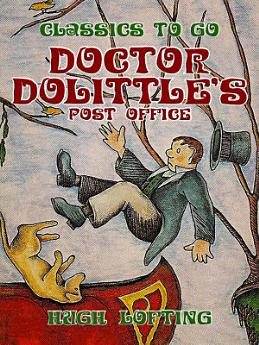Doctor Dolittle's Post Office
Jan 2022 · Otbebookpublishing
E-Book
156
Seiten
family_home
Zulässig
info
reportBewertungen und Rezensionen werden nicht geprüft Weitere Informationen
Über dieses E-Book
Doctor Dolittle's Post Office is the third of Hugh Lofting's Doctor Dolittle books. Set on the West Coast of Africa, the 1923 book follows the episodic format of most other books in the series. In the beginning of the book, Doctor Dolittle helps to capture a slave trader's ship, then organizes the postal service of a small African kingdom, Fantippo, ruled over by King Koko. Mobilizing migrating birds to carry people's mail from continent to continent, Doctor Dolittle effectively anticipates the 20th Century invention of air mail. Over the course of later chapters, he discovers a hidden island populated by prehistoric creatures, gets thrown into another African jail, invents animal alphabets, and defeats at least two armies. Each of the animals in the Dolittle family also tells a personal story. The postal program grows into a worldwide postal and publishing service for the benefit of animals everywhere.
Autoren-Profil
Hugh Lofting, born on January 14, 1886, in Maidenhead, England, is best known for creating the beloved character Doctor Dolittle, a physician who can communicate with animals. Lofting's journey to literary fame is as compelling as his imaginative tales. Educated at the prestigious Mount St Mary's College and later at the Massachusetts Institute of Technology, Lofting's early career was far removed from the world of children's literature. He worked as a civil engineer, a profession that took him across the globe, from Canada to West Africa.The outbreak of World War I marked a significant turning point in Lofting's life. Serving in the Irish Guards, he experienced the brutal realities of trench warfare. It was during this time that Lofting began writing illustrated letters to his children, inventing the character of Doctor Dolittle to shield them from the horrors of war. These letters eventually formed the basis of his celebrated series.Lofting's work is notable for its progressive ideas, particularly his advocacy for animal rights and environmental conservation, themes that resonate strongly with contemporary readers. His imaginative storytelling and richly detailed world-building have influenced numerous writers, including J.K. Rowling and Philip Pullman.Despite his acclaim, Lofting's work has not been without controversy. Some of his early writings reflect the racial attitudes of his time, which have since been criticized and led to revisions in modern editions. Nevertheless, Lofting's contributions to children's literature remain significant, offering timeless tales of empathy, adventure, and the importance of understanding all living creatures. His legacy endures, reminding us of the power of imagination to transcend even the darkest times.
Dieses E-Book bewerten
Deine Meinung ist gefragt!
Informationen zum Lesen
Smartphones und Tablets
Nachdem du die Google Play Bücher App für Android und iPad/iPhone installiert hast, wird diese automatisch mit deinem Konto synchronisiert, sodass du auch unterwegs online und offline lesen kannst.
Laptops und Computer
Im Webbrowser auf deinem Computer kannst du dir Hörbucher anhören, die du bei Google Play gekauft hast.
E-Reader und andere Geräte
Wenn du Bücher auf E-Ink-Geräten lesen möchtest, beispielsweise auf einem Kobo eReader, lade eine Datei herunter und übertrage sie auf dein Gerät. Eine ausführliche Anleitung zum Übertragen der Dateien auf unterstützte E-Reader findest du in der Hilfe.







